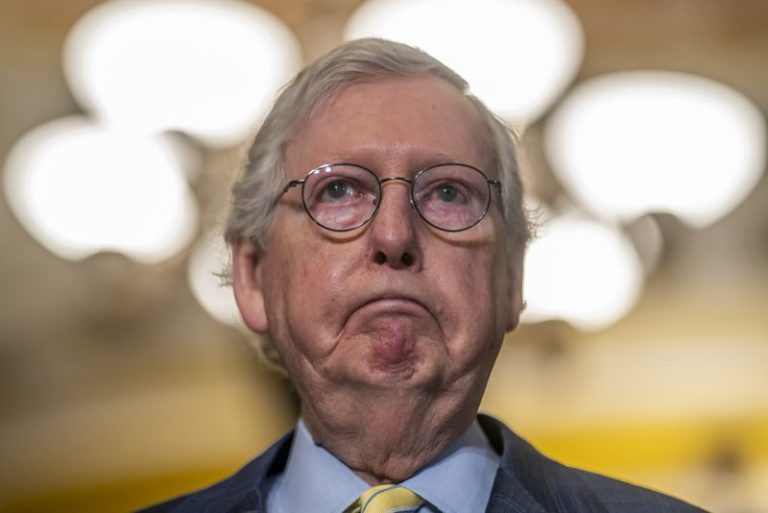Senate Minority Leader Mitch McConnell (R-Ky.) would like to make it very clear that it is not Senate Minority Leader Mitch McConnell’s fault that Mitch McConnell will not be Senate majority leader in the upcoming 118th Congress.
Speaking to reporters on Tuesday, McConnell revisited criticism he had made last summer, when a phalanx of Republican Senate candidates were trailing their Democratic opponents in polling.
“We ended up having a candidate quality” challenge, McConnell said, pointing out that he’d been warning about this in advance. “Look at Arizona. Look at New Hampshire, and the challenging situation in Georgia, as well.”
He added: “We had an opportunity to relearn, one more time you have to have quality candidates to win competitive Senate races.” The cause of the low-quality candidates? McConnell wasn’t subtle: “the support of the former president” — that is, Donald Trump — “proved to be very decisive in these primaries,” and candidates like those in the states he mentioned were the result.
It is obviously true that candidates like Herschel Walker — he of the challenging Georgia situation — were not particularly strong on the stump. It is also true that there was a consistent pattern across Senate races in 2022: Incumbents won, and open seats in states that heavily preferred one candidate or the other in 2020 backed the Senate candidate from that party.
In the two swing-state contests without incumbents, Republicans won one and lost one. This pattern is hard to attribute strictly to candidate quality.
Let’s consider the three races McConnell mentioned.
In Arizona, where Blake Masters lost by 5 points, and New Hampshire, where Don Bolduc lost by 9 points, the Republican candidates were taking on Democratic incumbents in states Joe Biden won in 2020. In every place where that combination was in play, the Republican challenger lost.
Remember, though, that New Hampshire also voted for Biden by more than 7 points in 2020. So Masters actually underperformed his party’s 2020 presidential outcome much worse than Bolduc did, since the shift in his race was 4.6 points more favorable to the Democrats than the 2020 presidential result, while the shift in Bolduc’s was 1.7 points.
Now compare Bolduc to Joe O’Dea, the Republican candidate who faced off against the Democratic candidate in Colorado. Over the summer, shortly before he was complaining about candidate quality, McConnell dubbed O’Dea the “perfect candidate” for the state. But O’Dea also lost — with his race shifting 1.1 points toward the Democrats relative to 2020.
In other words, O’Dea did about the same relative to the 2020 presidential results as Bolduc did. Despite his being “perfect” and Bolduc being an exemplar of the opposite.
There were 10 Senate races in states that backed Biden or Trump by less than 10 points. Four had Democratic incumbents who won, and four had Republican incumbents who won. In the other two races, in Pennsylvania and Ohio, the results in the Senate race ran to the left of the 2020 presidential results. But since Ohio is redder and the swing smaller, J.D. Vance won his election. Mehmet Oz, in Pennsylvania, lost.
What happened in Ohio is the opposite of what happened in Nevada. There, Adam Laxalt did better than Trump had in 2020, but Nevada was too blue for him to catch Sen. Catherine Cortez Masto (D). He lost by one percentage point.
The third candidate mentioned by McConnell was Walker. He ran even with Sen. Raphael G. Warnock (D-Ga.) in November but lost by a wider margin in a runoff. The chart above shows the runoff margin. Had we used the margin from November, his circle would land just left of the center dividing line. The shift to the left relative to 2020 was smaller in Georgia in November than it was in Ohio, where Vance won, or in Colorado, where O’Dea lost.
You probably know one reason why: Walker was boosted by sharing the November ticket with Gov. Brian Kemp (R), who won reelection easily. Kemp had coattails. But even without Kemp, Walker ran within three points of the incumbent Warnock. That’s substantially closer than Oz, whom McConnell didn’t choose to identify as subpar, did to John Fetterman.
Could different candidates have led to the defeat of Democratic incumbents in swing states? Maybe. But no incumbent lost anywhere. We’re admittedly raising the question here, but the 2022 midterms do seem to have been a moment in which incumbency bore specific advantages.
At the end of the day, it’s understandable why McConnell would like to identify Trump-backed candidates as the party’s weak spot. It is certainly true that candidates like Walker didn’t do the party much good. But the party also had wins in places where they underperformed and losses where they overperformed. They had perfect candidates who did worse than Trump had in 2020.
The problem wasn’t only candidate quality.

